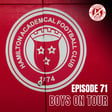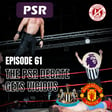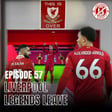Become a Creator today!Start creating today - Share your story with the world!
Start for free
00:00:00
00:00:01

Hamilton’s Talent Factory: George Cairns and the Art of Youth Coaching
This week we’re joined by George Cairns, a true pioneer in youth football development. For nearly 20 years, George shaped the future of the game at Hamilton Academical as Head of Academy Coaching and Academy Manager. George shares incredible insights into how he nurtured young talent, built pathways to the professional stage, and thrived in the world of youth football. ⚽
Don’t miss this deep dive into the legacy of one of football’s most influential academy leaders. 👊
Transcript
00:00:16
Speaker
ne
Introduction & Focus on Football
00:00:17
Speaker
Hello, hello, hello, and welcome to the Not Appended podcast. It is election week here in Ireland, but we're going to avoid all that for the next however long this episode will be. You can forget about all the worries and all the hardships of real life. We are going to talk pure and utter football. I'm
Guest Introduction: George Kearns
00:00:37
Speaker
delighted to be joined as ever by Connor Glennon and Nathan Byrne, but especially delighted to be joined by our special guest, Mr. George Kearns. Now, we spoke to Jerry Strain recently enough about Hamilton Ackies.
00:00:51
Speaker
And it was great to get an insight, but George is the man behind the youth development, which was like a key aspect of that episode. He has been brought true lads that are playing on the continent and playing in continental football, right from day dot all the way to internationals. And there is no better person I can think of for us to get that level of insight.
00:01:13
Speaker
to the real world of football. So George, thank you so much for joining us. Not a problem, James. That sounded, that made me look very interesting, When you are, see this this is the thing. am
Accidental Entry into Youth Development
00:01:26
Speaker
So like every interview, I'm going to do the the normal question first. How did you get into football and how did you end up becoming like an academy director? Because it doesn't seem like the most natural thing to kind of go, I want to be coaching the young lads yeah and bringing them true. It's the hardest work and one I'll tell you that. Yeah, well but basically it was by accident as truth be told. I had my own young team at Claybank where I'm um'm born and bred in Claybank.
00:01:56
Speaker
and my son played for that team under 10s and he was scouted for Hamilton a ah couple of weeks a when he was playing and we ventured through to Hamilton for him to get a trial with them and that day a we were just beginning the cycle of of of youth development. and We kind of came off the old-fashioned sort of s-forms on to Akana and academy structure and Hamilton were interested back then that the you know could we start an academy with this football club. I was just watching and seeing at the that the the chap
00:02:33
Speaker
ah was basically struggling with two teams at the same time. And I only asked him if he wanted a hand. And I didn't give him a hand that day, to be fair. And luckily enough, the the chairman of the football club was there that day. Sorry, the director of youth. That day was Les Gray, who's now the vice chairman of the SFN. So Les has worked his way up the ladder as well. So Les was one of the the the guys way back then that wanted to start the youth development at Hamilton, along with a chap called Ronnie McDonald.
00:03:02
Speaker
He
Career Progression to Academy Director
00:03:03
Speaker
was on the club for 18 years I was there and basically by accident the chairman came and asked if I'd be interested in coming helping him and it just it moved for there basically so the first three or four months I ran my wee boys club but and I also went through there and helped them do theirs and we basically progress from there to basically being a coach. And then from a coach, there was a chap called John Bean who was the original director at Hamlet and Aki's Football Club a of Youth. Les Bae was the initial boss, he was the director, then we had a head of youth below him, which was John Bean. And then we had several coaches like myself and sort of things. So way back in the
Youth Development Process & Challenges
00:03:41
Speaker
start, it was a kind of slow process to get to where it got to. And John Bean left after ah a few years in a chap called Frankie McAvoy, took the role.
00:03:50
Speaker
Uh, Frankie's went on to do great things as well. As you know, Frankie was obviously number two, Alec Neal when he left. He left Hamlet on Aki's to go to Norwich and he took Norwich into the, the premiership. So, so Frankie's done that. He's done a few. He'd been manager Preston. He's moved on. He was the number two at Hart's as well for a while under Nismith. Uh, so he then became the academy and director. And basically when Alec Neal was off of the job,
00:04:17
Speaker
he took Frank, yema and then they asked Charles. I was the Academy man at that time. I left my post for Arnold Clark, which I worked full-time, just to go to manage the Academy. So I was just managing the Academy, helped Franky do the actual job. And then when Franky moved on, they offered myself the job, and and and I took it. So it was basically by accident. like the but It's like the best nights out. It's the ones you don't expect. You don't you don't expect that. That's the thing. You don't expect that. you know So I'd worked really hard, i was i was I was always seven days a week, no matter what, with the boys club, with the academy, looking for players, and at that time we didn't have a lot of people.
00:04:50
Speaker
And we were just in the process of building that. But with good people running about, as you know, people like Les Gray, as I said, I keep saying, Les Gray, Ronald McDonald, you know, the owner of a football club called McGown in the background working out for sponsorships and different things and trying to get the money to to put it into the system. And and it carried on from there, basically. So that's one thing we've we've found from talking to kind of people who in clubs all across the world is a it takes a village to to to keep a club alive even just financially but just from a culture perspective but also like the biggest thing for me from from talking to yourself and talking to Jerry is you know Hamilton have had such an impact in football like the the i suppose diaspora of people who've been at the club has gone so wide you know
00:05:34
Speaker
Yeah, no, it's it's a... Hammers a fantastic journey. If people actually look at it, and to be fair, Jerry's later stages and that long later stages and that, you know, he's she's he's obviously running the youth development just now. So 18 years, basically, I was there. he He wasn't really nothing to do with that sort of side yet. He only came in later stages ah to do that. So that the journey was a long journey. It was a tough journey because at the start of the journey, you...
00:06:04
Speaker
you didn't compete as well as what you you thought you might have competed, you know, you were going out and you're finding these young players and you're trying to make these young players stars and sometimes it works and sometimes it doesn't, but when you are in Hamilton and you're sort of surrounding area is Murlewell Premiership Club, ah you look at Celtic Rangers, they these guys are all on your doorstep, so the process of trying to get the better players to you was tough because they're going to go to Celtic and Rangers, especially if the Glasgow or even the surrounding areas, India that has that that that sort of markets, they're going to go to Celtic or Rangers. So that's a thing that we thought, right, OK, well, you know, we will lose players to Celtic and Rangers. So what we will do is we will just try and work hard for players to keep them. And to be fair,
Identifying & Nurturing Young Talent
00:06:48
Speaker
we did that and we did it really well.
00:06:50
Speaker
a but took players and you know we made a success. ah and And identifying those players like kind of where, what what's the first port of call is is it you know tournaments like the Mill Cup or the Foil Cup or where you where are you finding these like kind of youth players? Well we were lucky we we you know we have but had people like Ronnie McDonald who just loved, this this this this man just loved to go anywhere and watch games and pick up a diamond, pick up a player, you know, any games, any level, even looking, we then obviously we built a scout network as well, which we kind of took in locally. And then you would obviously, outscrews a Glasgow and then your network would get a wee bit bigger. And you would generally just try and pick the better players. But, you know, sometimes, sometimes that was tough because obviously back then,
00:07:40
Speaker
One or two of these players would be way Celtic or a way Ranger, so you're trying to compete to see if you can try and sign them at an under-11 football. It sounds crazy that you're actually trying to go and sign a player and talk to them and say, listen, what do you want to do? Why would you go to Celtic? Why would you go to Rangers? Why would you go here? You're trying to compete to try and get these young players in.
00:08:01
Speaker
You identified them locally and you brought them in. know that The thing that I love the most is when we bring a player in at eight or nine, you you don't you don't know they're going to be a player. You don't know they're going to be a first team player.
00:08:15
Speaker
And what you've got to try and do is you've got to try and take that journey, you know, through the age levels. If you sign someone that under 10s and their player under 10s, your job as a coach is to get them to under 11s. Under 11s to 12s, 12s to 13s, no. The journey is long and you've got to have patience and the journey is up and down. And, you know, you'll have pitfalls, you'll have Loads of things come into it, you know, mental health's a big thing now. I don't know if you you you guys don't know that. Mental health's huge. Mental health's huge now, you know. There's a lot of pitfalls, you know. We always try to to educate parents, you know. Parents can be the one that stops the kid developing. And that's the thing, that's the number one source we think, you know, you play a game and you don't do very well in it.
00:09:02
Speaker
And I apparently tell you, don't know yeah the coach is going to try and pick him back up. The coach is going to try and get his mindset right. So I always try to educate parents. Parents are brilliant. They bring the kids to the training three nights a week. They bring them to their football matches. They'll have four or five other kids that are all scattered or replaced. So, you know, I've did it as a parent myself. So I understand the pitfalls, but it's huge. It's huge. And in trying to get that young player If we look at the journey, if we want to use the guys at an island, just now playing for land, you know, I seen Sean when them do Rhine when he was nine and we took them through the journey. Sean, I have a standard joke with Sean one, he plays for land. When I was leaving, he sent my lovely video telling me, you know, you're only probably one of the only guys that believed in me. At every age group, he kept me.
00:09:51
Speaker
He kept me at a rage group, he's seen something, he kept me at every age group, he played every age group and he played out, he was successful and he's successful just now. And that's the bit that I like and I love, you know, he had a baby, he scurried a baby a couple of weeks ago, he sent you a nice picture with a kid in it and that's the bond you have.
00:10:10
Speaker
Well, it must be amazing to see him just, you know, from that wee little nine-year-old progression to just even even outside of football, a dad must be amazing to watch that journey. But as as a two-time league champion and a cup champion, that's not a bad old TV though. No, of course, it's it's great to see that, you know. and Yeah, I left five months ago, and if I'm going to be brutally honest, i've I've went and watched most of the kids that have come through our system. And I'll be honest with you, if I was to singly go and watch every single kid that's come through our system playing a level of football, I'd be doing it every Saturday for a couple of years. And that might sound f frightening. You know, if fa see I say I watched four players play for the one team a couple of weeks ago, first at Canucks, I watched a young Danny Armstrong play in Europe for Kilmarnock.
00:10:57
Speaker
You know, and then obviously you've got Sean, you've got Andrew playing in the conference for for for and Europe as well with Lauren. That's an amazing
Success Stories from Hamilton
00:11:04
Speaker
feat. You know, it's huge. You've got players like Mikey Devlin, Scott McMahon.
00:11:09
Speaker
and George Stanger, who basically played for Air United, they've came through our system. You know, I look at your story, I mean, some of the players is, it's no, some, a maroon's full of signed tops for different players that have made different eras. George Stanger, we signed, and George represented, he represented New Zealand in an under 23's World Cup and got to the quarter-finals. He also represented New Zealand in the Olympics.
00:11:35
Speaker
Well, that's some feet. That's a huge feet. When you actually sit back and you think, I've got to sign jersey northern in New Zealand, sign jersey for the Olympic jersey and the World Cup jersey, it's not like you look at you think, wow, that kid played in the World Cup. With players like that, the like obviously hindsight is 20-20 in rose-tinted glass and all that, but do you see it as far back as 9, 10, 11, you go, he's going to go all the way? You know yeah yeah don't see it way back there. All you can do is believe the system that you have is going to help them get there. And you then have to have the belief that the manager's going to play them. The manager has to play them. And that's one thing we do at Hamilton, or we did at Hamilton, managers played our young kids. Managers played our young kids. That was really, really important. They bought an A.
00:12:23
Speaker
the ethos of the football club, you know, we've we've we've had many, many, and no and I mean, we talk about players, I could talk forever, we talk about players, but we talk about staff that came through Hamilton as well, you know, we've got Victoria McIntyre was a physio with ourselves, starting our academy, worked our way up to the first team physio and now out a first team physio at Bournemouth.
00:12:44
Speaker
With Kevin Simon, who came in as a sports scientist, now in charge of sports science and medicine at Aberdeen Football Club. You know, we've got Colin Clancy, in sports science and medicine at Birmingham Football Club. You know, even even people in that environment have moved on to bigger and better things as well, which is fantastic. And that's all, yeah you know, Hamilton, Hamilton Aki's was a club that promoted, you know, if if something out there that that you can go, go for it, you know, and as well as players,
00:13:14
Speaker
the staff members I moved on. Alec Neal was obviously a player of ourselves and coached her under 17s in the academy then became her first team manager and at one stage before Alec left we were sitting top of the premiership. We beat Celtic 1-0 and we were sitting top of the premiership.
00:13:30
Speaker
And then a couple of weeks later, obviously, I left to go to Norwich and took Norwich up to the Premiership, which is a huge feat. Martin Cannon was the same. Martin Cannon worked well down at Sunderland and down at Stoke as well. Martin Cannon was the manager that came through our system as well. He came through our youth system as well as being a player. The players would come in and coach the kids as well.
00:13:49
Speaker
have that rapport, so when Martin became the first team manager, Martin knew all the good players, Martin knew the players that were coming through, Martin knew how to speak to him, Martin knew their names, which was really, really important. He knew their names, so he could speak to them, he could say, the one named this, oh he's the manager, I can't speak to him, we didn't have that, we didn't have that at all, you know, and that was a good thing, and Martin martin kept us in the premiership for four seasons, four seasons we stayed in the top division under Martin Cannon, which is like but a phenomenal feat, a phenomenal feat if I look back.
00:14:17
Speaker
and And George, just looking at the players when they're coming through, is there a time in a player's career where you can go, that's the most pivotal time, or does it does a vary player to player? Players are all different, you're better players, see you're better players at 8, and sometimes know you're better players at 14, or 15, or 16, and I always used to say to my coaches, someone always comes out of the pack and surprises you.
00:14:43
Speaker
Well, you think maybe 11s and 12s. I mean 13s, 14s, I'm not too sure. And then all of a sudden, he's your best, but it's 16s, 17s, even 18s. So it's a kind of up and down journey. And it's it's important you try and keep on part of that journey. You try and get him doing the right things, which is important as well. You'll know that yourself to get to where these people have to go. here it's It's tough. They've got to make huge sacrifices.
00:15:11
Speaker
A lot of sacrifices as a young player, you know, kind of get with your pals, carry, you've got a game the next day, you don't know, you kind of drink, you kind of smoke, you kind of take, but yeah all these things are falls for the young player to succeed. And when they succeed, it's a fantastic achievement. It's a huge achievement. You know, we're missing a player that I've not even touched on, is Louis Ferguson. Yeah, I was waiting to hear about him.
00:15:39
Speaker
Lewis Ferguson is a fantastic talent and a fantastic kid. Rangers let him go under 13s, 19s, 14s. Obviously thought he wasn't good enough and luckily enough his his dad picked up the phone to myself and I took him into Hamilton under 14s and he just worked really hard. He's a hard working kid.
00:16:01
Speaker
did everything he asked him to go and do. Fourteens, fifteens. When we got to sixteens, and this is us this is a strange thing, he used to think, wow, but this is what I i just thought, this this this kid's going to make it. At sixteens, I offered him a full-time contract, and he was, like wow, maybe didn't think he was getting one. Mum and dad were there. Mum and dad, fantastic people as well, so they bought everything they did. Dad obviously played at a high level.
00:16:28
Speaker
Dad was brilliant for me. Never once did he say, did I say this to that? He would always ask what can I do to get what's better when he's nowhere, George and different things. So he bought on it as well. Mum's a lovely person. What's a lovely, lovely family? They were brilliant for me. And when I gave him the full-time contract at 16s, he was obviously going to be under 17s football. And I'd say to him, first three or four months, I might keep you back playing 16s to try and develop you. So, not a problem. No.
00:16:56
Speaker
Some players now would think, why does he keep me back? I'm not good enough. You know, that's that's how a player will react to that. No Lewis. Lewis says, no, no problem. If I've got to step back at 16s for a couple of months to develop more, that's better. Lewis, two months, two and a half months at 16s, and I say that he's to move on. He developed both. And at 17s, and at 18s,
00:17:20
Speaker
into the reserve team, 13 appearances for the first team and then went to Aberdeen for a quarter of a million and done very well at Aberdeen as well and then obviously moved on to Bologna and speaks a language, you'll know that, speaks fluent Italian, went over there, embraced our culture,
Lewis Ferguson's Journey to Champions League
00:17:38
Speaker
embraced our language, captain of Bologna Played 10 minutes two weeks ago in the Champions League. We've got a ah player from Hamilton Aki's Football Club playing Champions League football in Italy. Most make you proud. yeah off so I'm sure proud of him. And the other bit that probably people don't recognise, he was voted best midfielder in Italy last season.
00:18:02
Speaker
Think of the neighbors on that trophy. He was a prisoner. Think of the players that's won best midfield player in Italy. We know Italian football is graced with some fantastic players, but I've got a young kid from Hamilton from my academy.
00:18:19
Speaker
He wins that one. It's amazing. I smile every time I see him, i I'll send him taxis. I often send him taxis. and Great kid, great family and ah and and a huge success for the Academy.
00:18:34
Speaker
a great testament to the work that you've put in and just for like context for listeners just in case they don't know like Lewis his dad Derek was a footballer and maybe probably more recognizable on on this side of the pond a Barry Ferguson formerly of Birmingham and Rangers was his uncle yeah yeah so like it's a family that knows and for them to put the trust in you to say well not not only are we not going to interfere but we're not going to speak up when we may not agree with some of the decisions like keeping them back it's it's fantastic but like
00:19:08
Speaker
as you said, you could be going every Saturday for years to see the players that you developed yeah in an industry where the 1% of the 1% only ever make it. yes It's an amazing testament and it's something on this podcast that we're always interested in, like from from an Irish perspective is how can you make that 1% more realistic. So like, it's taken the League of Ireland a long, long time to become a realistic job for players and a realistic area for them to progress in. And now we're now looking at the youth side of it. How can we keep the players here? Obviously Brexit's a kind of a thing for us where they're not getting posted as early, but there is still that kind of, we have to do right by these players. Yeah, yeah. Obviously, when you came in, it was establishing a youth development system.
00:19:58
Speaker
What kind of challenges or what do you think can be done to kind of better serve these young players with limited resources? You you have to oh that's through sound you you sell them a dream, but the dream has to be realistic. Well, Hamilton, the dream was realistic because we have pitchers all over the stadium. So the minute you take a young kid and a eight he sees a Lewis Ferguson,
00:20:27
Speaker
He sees a Mikey Devon, he sees an Ali Croft, he sees a Grant Gillespie, he sees a Danny Armstrong. He sees your Under-18s won in a league championship and representing ah Scotland in the UEFA Under-19s Youth League. He sees that because they're there. The pictures are there. And and we always say, I'll paint a picture and you don't need to paint the picture because the picture's there. So that's how we redev developed because we we didn't have to sell it.
00:20:52
Speaker
We didn't have to sell it way back. We thought, God, I'll give you something. Youth system, youth system. Every time we spoke, it was about the youth system, the youth system, the youth system. I got a good youth system. Now, if you actually speak to people, anyway, you bump into and you say, Hamlet and Aki, they'll say, they've got to get your system because you've promoted the youth system. They see the product gets on the pitch. You know, that comes as a whole from owners of the football club because owners then have to buy into, you know, it's about young players.
00:21:21
Speaker
managers have to buy into that, so every single person at the football club buys into us trying to put young players to go and play. That was that that was the the main, can we get young players good enough? Yep, we can get them good enough. Can we can we get them to the first team? Yeah, we can do that as well because the manager buys into it. If you're good and enough, you'll play. Does the owner want to come and watch that? Yeah, of course he does. I've stood at many, many, and and this is where I've stood in many training games, many going and watching our teams play all over the country.
00:21:51
Speaker
standing with the owner of a football club, Ronald McDonald. Another owner of the football club, Les Gray, they stood and watched these games with us. So, although they're owners of football clubs, they bought into what we were trying to build. In the bit but we were trying to build is, can we get the eight-year-old player to the first team? But then you've got to have the patience. You've got to have the patience to think, he's a good player. He's a good player. That one's a good player. They're not a bad team. There's four or five in that. Oh no, there's five or six in that now. Oh, I think one season,
00:22:22
Speaker
I think the record for me getting full-time contracts, I think we're seeing nine young players one season, nine young players to give them a go and push them into that environment. And that's that's the bit where you've got to have the patience, you've got to give them time and and and no even taking a young kid at under 16s, you take them into full-time football.
00:22:47
Speaker
The body isn't about to go for three nights a week to a Saturday to five days a week, six days a week, and again training, training twice a day, you know, so there's pitfalls and there's things that you try and do that tries and help what what also tries to help them, but it's really important that ah yeah the belief thing is huge.
00:23:07
Speaker
You can sell it, but you don't have to sell it if you actually have it in the products there, which we had the products there. People seen that, the product was there. It's sort of talent, obviously, and and hard work. What are the characteristics that you know you would have been looking for in a young player? Because
Traits Needed for Young Players' Success
00:23:22
Speaker
I'm just thinking from the perspective of a young player listening or a parent of a young player listening, what is it? Obviously, talent is the non-negotiable thing here. but But outside of that, what's what's kind of the key trait?
00:23:32
Speaker
Players, listen, players will have talent, but there's a lot of players come through the system that might not have had that talent. They get that talent as they come along, you know, as they take that journey, you know. We try to build, I say we try, I always say we try to build, but I did build it, we build it, we build another give up, refuse to lose. That's what we refuse, never give up. I know people think, ah, it's easy to say, you never give up. If I was to sit down with every director of youth in the country that I competed with,
00:24:02
Speaker
And they needed three points to win a league championship. Take one to Europe. The last place they'd want to come is Saint Wannaki's football club. That's the last place. And that's the mentality I try to build. Make this a tough place to come to. Make it a place.
00:24:21
Speaker
As I've seen me as a whole, can we make this play stuff to come? Can we make it? Still going to rainy Tuesday. Well, basically, you know, that sees mentality. Everybody's against us. And and and coaches, listen, we get a lot of fantastic coaches and physios and all these people play a huge part as well, because it's not just me, you know.
00:24:39
Speaker
Although I'll edit, we get some really fantastic young coaches that have moved on to bigger and better things, as I keep saying. Even the physio playing a part of the sports science, everybody played a part of it, but everybody bought into that model. And that's why it was successful, because we bought into that. I mean, we were all looking for the same thing on a Saturday. One of the players sticking to Hamilton Aki's jersey on and going and playing in the first team. There's nothing better.
00:25:04
Speaker
I've been at many, many debuts. There's nothing better than sitting there as an academy director, along with the guys that have done this. And I always, always gave credit to the guys. And, you know, it's not just me that this is, this is the coach at 11s, the coach at 12s, the coach at 13s, the sports science at 15s, it put the wee bit of extra in. The physio that maybe helped him get his mindset right for the game or whatever, you know, they all played a huge part in trying to get them through the system. The last four, I think we, the last four before I left,
00:25:35
Speaker
that we sold, we sold Gabriel Forsythe 16 years of age to Norwich. He's now in the first team environment and he's played a few games and he's always in the squad. We have Ryan Oney who's at Sheffield United. He actually scored the other night. He's 17 years of age as well, young kid. Fantastic, fantastic talent. We have Josh McDonald who signed for Leeds.
00:26:01
Speaker
and we had Cormac Daly who signed for Norton Forest so that was the last four players that moved on. They moved on when they were 16. The kind of markets changed as you spoke a wee bit about how do you keep your players. Before these we were able to keep our players and players like Lewis played in the first team and then moved on. Players like James McCarthy played in our first team and then moved on. Players like James MacArthur who played in our first team. A lot of pains he's in the first team and then moved on. The markets kind of changed now You know, they're looking to try and come and get your kids at 16 and 17 at a young age group. And it'd be fair if you're Hamilton Accies, you've got to try and embrace that and try and get the best out of the deal possible. You want a kid to go on and do, you want them to do well, no matter where they go, you want them to do well. Whatever level they find, junior level, league one, league two, first premiership, whatever, you still want them to do well. So that's the most important part. So although we are selling those four products, you know,
00:26:59
Speaker
fans will say oh how can we all keep them to go and play but you know how could i keep how could i keep Lewis Ferg isn't it going to play in our first team if i've had the inner chap in the door and they want to speak to the world we see it in Ireland all the time you know there's there's plenty of players that that we'd love to keep but in the league but you know you don't want to hamper their their success down the line and and and as long as the deal's right for the club but you it it allows you know facilities to be upgraded and and better coaches and everything you know also there's it it's putting money back into the put but money back into the academy and the structure. Because the structure is quite stringent. We've got an elite structure here now where the elite clubs have to adhere to the different aspects. And it gets tough because that can cost a lot of money. A lot of money. you know I think our budget was £350,000, £400,000 a year. That might not sound a lot, but for Hamlet and Aki's football club, that's a lot of money. We have fan base of 600, 700 fans.
00:27:53
Speaker
You know, that's no, it's no, and I'm not, I'm not declaring the fan base. That's just, that that's just a club. But as I said, how do you build that? How do you work that for you? You put that siege in mentality and it'd be fair, you know, that worked for us because, you know, we, we won two 18 leagues. Hamanaki should never be winning under 18s leagues.
00:28:13
Speaker
We should never, I think Rangers and Celtic fish should be miles in front, miles in front. You know, Aberdeen strong as well, you know, Dundee and Ateed, Hibernian hearts. You know, one of those seasons, our coach Dougy Emery, who's obviously now coaching at Moreton, Dougy took her into ratings and the season, the first time we wanted to qualify for the UEFA League, we were unbeaten, we were invincible. The whole season. The whole season.
00:28:40
Speaker
Three youth team to pull that off. like it That's unbelievable. Home and Dundee United. Tough, tough, tough ask to go and do that, but we did it. You touched on on James McCarthy there. i think I think it'd be remiss of the three of us as three Irish blokes not to ask about him. What what was he like as ah as a ah a young buck coming through? Great kid. I'll always say he was a great kid.
00:29:09
Speaker
Great football. Great talent. Great talent. Fantastic talent. I watched him when he was 15 years of age playing in our first team. 15 years of age. Still playing in our first team. Do you know you couldn't do that now? You can't do it. You've got to be 16 to go and play now. Oh, I didn't know that. Yeah. Yeah. We've got to be 16. The lot that may have changed. And I remember one season we stuck a 15 year old kid in a linen parade was his name. And we stuck him on our bench.
00:29:38
Speaker
And we ended up getting any baller because he had a turn 16th and we played him in our reserve game. We'd made a mistake, we should never have did that, you know, it had to be 16 to go and play, but if that rule had been in three or four seasons before that, James might never have played for a first team, so that journey, the journey started when he was 16, that's not a problem, he's a fantastic talent, he would have played at the highest level, but it just shows you how it changes, and it has changed. I don't know if it's went back, i've not I've not quite looked at that yet, but I know that was one of the rules, but James played for a first team when he was 15 years of age, under the manager I was Billy Reeds,
00:30:14
Speaker
and did very well for us. Did very well for us. Fantastic talent. Brian Easton was part of that squad as well. Brian Easton went to Burnley. Both James McArthur and James McArthur, both went to Wigan and did extremely well. I went myself and killed him and were joking before we came on. They both played for Wigan, both played Midfield, basically of the same name. It's one of those, have you ever seen him in the same room at the same time?
00:30:38
Speaker
exactly Exactly, fantastic talents, both of them by the theatre, including Bryan Easton as well, fantastic talents. Both James has done really well, James McCafford has done very well down at Palace, he always played a long time down at Palace as well, and and you'll know if James McCafford's journey, you'll know.
00:30:52
Speaker
Everton and then obviously Palace and then obviously back up at Celtic as well. I only he played eight of the few caps under in Ireland as well. I played in the European Championship so I ah can tick that off the list as well. <unk> competition representers ches You know, it's it's fantastic. ahs fantastic you know As I said, Lewis obviously will represent Scotland at some stage as well. You know, he said he's had a few caps there, so I've got a sing jersey at the back of me from Lewis. He's first in his first game there as well. I've got one for Mikey Devlin who represented Scotland as well. So it's, listen, people will say, hi you know, it's ah as a tough it's a tough, tough, tough job. It's a tough job because I've broke more hearts than probably made. If you can understand that one, ah can be the I can be the last line of defence that actually sits in front of a kid.
00:31:40
Speaker
takes away their dream. You know, I go on and play in first team football and that's tough and that takes its toll. A lot of people think, oh, you know, I used to laugh and joke when I had parents' meetings that if I walked in a room, it went went quiet. de bitton And it's a, it can be a lonesome job, a real lonesome job, but you've got to be honest and you've got to be upfront.
00:32:00
Speaker
And what I always try to do is if it wasn't in the environment, Hamilton always tried to find something that they could go and play because if we can just try and keep on playing football, that was important for me. And as I said, the the mental health side of that app comes into that as well. You know, when when things are only going great, you know, some kids some kids need to be bit more time, some kids need an arm and a shoulder, some kids need a rock at the backside and that's just the way they reacted it. and um And and and and it's it's changed now, you know, the environment's changed, it's changed, but we have a lot, a lot of talented kids, I've seen a lot of talented kids out there and I still see them play week in and week out and sometimes think, wow, why is he no play? Just been given a
Mental Health Support in Youth Football
00:32:40
Speaker
chance, just get somebody to believe in them.
00:32:43
Speaker
just Just for any listener, that ah you you mentioned ah but Billy Reed there, bringing true and James McCarthy and MacArthur. just If her anybody's kind of going, why do I recognise that name? Billy Reed actually went on to be Graham Potter's assistant manager that from Ostersons all the way to to Chelsea, just just to put anybody's like nerdy brain like mine at the rest. Both of them did a fantastic did a fantastic job at Brighton as well. Yeah, it was an amazing team. and i and yeah they successful and any listeners of the pod knows I've been a very good big fan of Cough around it and is coaching staff for it for a long time. But you mentioned there like with the mental health for for young players and and obviously with the as you mentioned the the law change on 16 year olds and protections of playing and in the mens men's games like we've seen over the years the likes of the English FA bringing in um
00:33:34
Speaker
the ah tape around the pitches for this is for playing zones and for staff for coach coaches and this is for where the parents are to but to be respectful do you think governing bodies are doing enough to kind of ah nurture the mental health of young players and give them the kind of the best part possibility to grow because i think it's one of them things that like they can never really do enough but have we gotten to a stage now where in comparison to maybe 10 years ago that this should foster a ah much better generation or two in the next couple of years? It's a tough question to be fair. It's a tough one to answer. Do we do enough?
00:34:10
Speaker
a I don't think we do. I don't think we do. And what do you think that is? What do you think we we that could be done more? I don't think we'd pay enough attention to the kids.
00:34:25
Speaker
I don't think coaches pay enough attention to the kids. No, I'm not having to go any coaches. i'm no i'm not that I'm not doing that. I'm just saying, if you are a coach and you coach a team three times a week and take the game on a Saturday, you'll get to know your players. If you're good, you'll get to know your players. You'll get to know different things that you'll see and you'll get to see different behaviours and if you're a good coach, and and we've got loads of good coaches, fantastic coaches there, they'll man-manage that best they can, but you're asking a coach to do the training session, organise the team, this and that, it's a lot for a coach to do, and then you're saying, if we're really good at what we do, get to know the player. Get to know the player. The kid behind the player, I suppose, is is is what you're getting at. And that's key to how probably
00:35:15
Speaker
Probably I was successful because that's what I did. I made sure I knew the player, or I knew the players, I knew the parents, I knew the background, I knew that. I just took my time to do that. And that's probably a bit, maybe I was a wee bit more successful because there was players I could gear a bit to, you know, oh, come on, you've got to do better. All those players, you need to put an arm around them and you would know, man, something not quite right here. So it's talking to the players and, you know, you're trying to educate them. It's not always about winning.
00:35:46
Speaker
can he always be about winning? But winning is important. Let's not kid ourselves. Winning is important. Winning is very important. It's how you, how do you bounce back from mistakes? Because you're not going to see that in the player until you actually see it happen. So I always used to go to games and I always look for characters in games. People used to laugh. I'd sit out of the way. I'd just go myself and sit and I'd watch a game. I'd look for a character. Sometimes I would look I quite enjoy being 4-0 down here. I know I'm going to see what I've got. I know I'm going to see Oijo roll up the sleeves, get stuck in, go and try and drive forward and that's where you probably find more of your talent when you're looking at teams when it's against you. When it's more against you, you look for the ones that kind of stick out or the ones that maybe key that wee bit of extra, the ones that never give up, the ones that just keep going and
00:36:34
Speaker
How do they bounce back? Again, look at my training the next day. If they're in under 18s or in the next day, you look at how their mood swings are, you look at where they are, do they really, does it affect them that much? Can they bounce back from that? Do they sit mopping all day? Because it's and it's tough. It's really tough. So back to the question, do we do enough mental health wise? I'd like to think we do, but I'm not sure we do. I'm not sure we do. I'm going to go a lot of good care. Mad short. Mad short. Yeah.
00:37:02
Speaker
just Just a quick one to tie into that question, on aftercare for players, ah have you seen an improvement in that in the years and what what is the process once the players let go? The process is a tough process. First and foremost, the players world oldd basically falls apart the minute they let go. So how do you deal with that? It's a tough one. Some parents and some kids will take offence to the guy that's telling that, which is sometimes me.
00:37:30
Speaker
you know But what I always try to do is always try to find them another club. I always try to keep them involved in football. No, I'm not going to get everything right. You're never going to get everything right. You can just be honest and upfront. Sometimes honesty might have been a bit much, but I always believed that being honest and upfront and just telling them what you think was the best route. Trying to find them another club is what I always try to do.
00:37:53
Speaker
Can I find another club? Can I, I'll pick up the phone at any academy director and ask them, listen, take a wee look at such and such. He's not quite right for me, but I think he can do something for years and i'm no to climb with your system. I'm just saying, have a look at him. He might be something that used might actually use or used might actually. Would you ever get parents, kind of, or kids reacting that, you know, you're you're doing them a real service. They're trying to find them a new home to to play football in, but they're they're kind of like, no, you don't value me. I'm out. Don't bother. I'll i'll find myself.
00:38:20
Speaker
Yeah, of course. Of course you do. Yeah, you got a lot of parents, yeah. You got a lot of parents then. Most parents will be realistic. And I was always used to speak to my coaches. A parent will always ask the coach, how's we Joe Bloggs doing? Sometimes a coach's easy way out would be, he's doing okay. He's doing okay. And then four months later, you're sitting in a room where the coach is actually talking to the parent and saying, now he's not done that well. But I asked you four months ago, he was doing okay.
00:38:48
Speaker
So I always used to say to the coaches, see if he's not doing well, please be honest. Please be honest. Because what we did at Hamilton, every single game that we played, I designed a match report. Every single match report was there for the game, so they would get a rating, you know, they would get a rating in the game, they would get their time in the game as well. So you we knew exactly how many minutes this kid had on the park.
00:39:11
Speaker
We knew the position he played, whatever he played, and we knew if he scored goals, whatever. So every the the paper trail was a must because you got 130, 140 kids. So you need to you need to be able to identify that. so And with the players have access to that? Or would it that's just for internal? No, no, what would happen is when the players, what I used to do with my players was I used to do the game on Saturday.
00:39:34
Speaker
And this is when I was a coach and I was still working. And the Monday I sat with my players and I asked them to mark myself and tell me what they thought. That's what I did. And they would say, maybe Tim is excellent. No, you're never going to get excellent. Never going to get excellent. Nine, very good.
00:39:53
Speaker
Eight was good. Seven, satisfactory. Six, looking for better. And five, you would probably say, poor game. So that was the marking system. just it And it was only a paper trail. It's only a paper trail to you. You can keep an eye on the player and how he's progressing. Why is it any of your times we're going to say, oh, he's he's put 16 in. Maybe next week he's only playing 13. That's a bit strange. You get 60 last week and he did really well. And why is he only getting 30? So then you would be able to look at to the coach, what's happened there, oh he was mid late for training, i'll be such and such shot of he got he elected again, he was due to playing at it, so it was a good way of looking at that as well because you could look for different different symptoms, different patterns that would help you go and try and fix that, you know, and that was a great thing and that's why that's why we we did that and it it was also important that you could sit down with the parents three times a year and go through that process with them as well, so you could sit and say
00:40:44
Speaker
a Seven, seven, eight, six, five, and then you see well yeah a couple of, and then see if I usually see these sixes, and no I know I would think, all right, I'm going to have a wee chat with that coach Raskin, which there's no really, what's his sixes? Because he's went for an eight to six, so what's actually happened is it could be a growth spout, could be injuries, could be, you know, there's loads of different things, loads of different things. No, I'm not saying we got it right, but it was ah a tool that we used that helped.
00:41:10
Speaker
it helped us ah immensely. mrow you I think they'll still use that tool. That tool will still be there. I think that's important for a director to be able to see that as well. It's just your way of gauging how well it's doing.
00:41:22
Speaker
have you seen a ah kind of ah we hear so much about it now, but especially in the men's game, data analytics, like all that kind of stuff. Have
Data Analytics in Youth Training
00:41:32
Speaker
you seen that kind of come into the youth setup? Cause that sounds like a, albeit a slightly blunter way of doing it, but that's fundamentally the same thing. Kind of early Brighton vibes, you know? Yeah. Well, to bonus we, yeah, the, the the game, at the game has progressed that way because just before I was leaving, uh, about a year previous, we brought on a young kid, uh,
00:41:52
Speaker
Joseph McGlynn, a 21-year-old kid, we brought him in as our Coaching the Coaches analyst. That's what he was. He was brilliant, top draw. As a matter of fact, probably one of the best I've worked with. Absolutely fantastic at what he did. Yeah, he's now moved on to Queens Park. But when Joe came in, Joe would analyze training. He would take every single coaching system. Joe would make the coach up.
00:42:21
Speaker
and watch his system and film it. And then Joe would go through the system and then we had certain marking criteria, you know, how often was the ball in playing training. How often was it out of playing training? How often did the coach speak? What was the positives that the coach spoke? What was the negatives? So Joe was able to sit with all your coaches and he would sit and say, well, maybe you had 10 negatives to one positive. Maybe the ball was out 30 minutes of your 60 minutes training session. So he was able to analyze all that. And then what were the coaches?
00:42:56
Speaker
He also worked with the players as well. So he would then bring the players in as well. The games would be filmed and Joe would sit down with the players and say, well, could you have done this? What would you have done there? Maybe you could have done this. And so you're bouncing ideas off, but you're actually like trying to get any answer to the questions. And was was that welcomed by the coaches at first? Because because because obviously, you know, you're get if if you're getting a bit, you know, filleted, shall we say?
00:43:17
Speaker
we will have people that are against it, you'll have people that are against it, but we embraced it at Hamilton. And I asked my coaches, he's embraced us because he's no there to say you can do this, you can do this, you can do that. He's there to make us better. That was his role. Can you make us better? Can we, that small tweak that might give us that extra 5% that might make us that 5%, 10% better? And to be fair, all the elite clubs had to take one of these coaching, the coaches rolls on as a full-time basis. So every single club had a coach, the coaches won. And for me, young man was immense. Absolutely fantastic at what he did. speak to Joe on a regular basis. I think his knowledge of football is, is and you've got to embrace it. You know, he's, he would see things and you think, wow, I like that. I like that. You know, he knew how to talk to the coaches. He made my coaches better.
00:44:11
Speaker
That's taken part of my role of me. I didn't have to worry about that. A 21 as well. I wasn't yet a game and Joe was it again? Joe would tell me what he was like or what's happened in the game. Could do this better. and Maybe it is. We moved the ball really well. We got out of the pipe, we played out of the ball and Joe would put scenarios in and he'd work with these guys and what were the coaches then?
00:44:30
Speaker
At the end, Joe would be able to sit in a three, four months and sit and say, look, there's all the positives. And he'd be able but to say to the coaches, look, look at the movement of this one. Look at this. Look at how we moved the ball from there to there. That's where we worked on the training. That's a positive. That's work for us. So obviously he was there a year. Obviously, I was sort of left after the year, but I think if I'd still have been there, Joe would still be there to be fair. yeah But the first year was fantastic. The second year, you would be able to gauge the first year and the second year to see if you've got it better, then see me getting another three or four years, then you can use the four years of, right, okay, we know all the different aspects, how do we make it better? So you're able to gauge it against the previous years. So it's still on its early stages, but for me, that was a huge help. Having someone else to to bounce off your coaches is great, because your coaches would then go and ask questions and different things. And Joe would send the games to them. All the coaches would get the games. So all coaches would get the games after the game.
00:45:26
Speaker
and all the players would get their own clips as well. So a player would be able to go home and watch his own clips in the game as well. That's a brilliant infrastructure that you guys build. I don't get the works involved in that. Every single player in your academy is able to go home and look at their clips, just their clips, no MDLC's clips. My worry was if You're looking at other people's c clips then, you know, but like WhatsApp, so I've had this one's better than this one. that's No, no, no. What we're going to try and do is just, if a player can just look at his own clips, fantastic. So that's, that's, that's how it kind of progressed to get there. So players were able to sit down and look at their 25 touches of the ball and again, and then Joe would ask them, could you have done anything better? What did you do there? What was your thought process here?
00:46:07
Speaker
and Most of the time it would be well done there, you drove the game well, yep, pass was a great pass, that's the pass I had played under pressure. So it was a fantastic tool, a fantastic tool. He seems to coach beyond his years. Of course. Well, listen, for me, the man will go to the top, and I've said this to him, he'll go to the top and he's working at Queen's Park just now, but I think the guy they get like the kid's fantastic at what he does. He just sees the game, knows how to talk to people, and for me, certainly one of my best signings. Certainly one of my best signings.
00:46:38
Speaker
and actually shout out to Joel for putting us in touch with you George. Before him was Declan to be fair. Declan McKee was another one that was fantastic and did really well for us. Declan now works at Harts. So Declan had actually done in that view with all on a Declan was great. Declan did all the stuff before Joel came in and and Declan says, listen, I think you take this guy in. I think he's got a good chance here, George. I think you'll like him. And it was on the word of death on the cane saying bring this guy in he'll do all right for you and I'll have a look back. I thought the kid was fantastic, absolutely fantastic. Yeah I'm actually very conscious of your time and you've been fantastic. You're okay. I've been fantastic to chat to but I want to kind of ask you a slightly more general question on like
00:47:25
Speaker
I think a lot of football fans have an idea of what academy is and it's going to be big and ah like an overall structure and not a full-time coaches but obviously that's just not the case in in in for majority of teams in majority of countries. Are you seeing in Scotland a move to more full-time coaches and staff because like it's one of the big things here in Ireland like there is like a handful of full-time academy staff in the country yeah and it's it's one of the big kind of moves from a lot of like and we spoke to a former Leeds player and League of Ireland player Alan Cauley recently enough and that was one of his big
00:48:06
Speaker
I don't want say bo bears will even like if we want to if we want to push on, this is one of the most important things that we can do and invest in invest now for a decade in the future. Are you seeing that kind of move to a bit more of a full-time structure in Scotland? Yeah, well, to be fair, the Academy went full-time. Most of its posts went full-time. and We went on a part-time basis to, obviously, Director of Youth was myself. ah Below that, you would have had we had our ah Under 18's manager was full-time. Tree was working with your kids every day. He would have an under 16's to 13's head of academy who was full-time as well. And then you would have your, which I think is the most important part of your academy, is your junior academy, your junior structure. You know, we'd guys like Kevin Tiger who was a head of, when I first started it was it was a Matt Boyle who took that role. Matt Boyle was great for us us as well.
00:49:00
Speaker
moved on to bigger and better things as well and then we moved on to Kevin Taggart who was in the set up and Kevin although we say it's a full-time post they work at night so they most of these guys were still doing some of their day jobs during the day and then working full-time at night so the academy is at night so you know these guys would be doing all they was under the sun if truth be told but they did it for a love of what they were done and that's to me but that I don't know but how other academies work. I always found
Foundational Skills at Young Ages
00:49:27
Speaker
that the important age groups for me were the ones at eight and nine and ten because if you can ingrain the right stuff you reap the rewards later on and that's why we've been so realistic. I think we've got about 17, 18 plus it's played at every single age group and then the first team. That's a phenomenal feat you know but if we get it right at that we've got a chance. I always just say
00:49:50
Speaker
Not so much hold him up in a peristole but these these are important because these these these coaches are working with 78 year olds and that can be quite challenging, very challenging. But to be fair Kevin was another mainstay for myself that that they looked after that part of the academy then they progressed into the junior academy, sorry the junior academy and the senior academy which was 13s.
00:50:11
Speaker
to 16s and then for 16s obviously you were going to enter 18s football basically because we would sign them at 16 and play them at 16s or under 18s football. That didn't worry me. That didn't worry me because about two years younger you're going to fling them in and you're going to let them play and there's been when we won the league the second time round the first season we did okay but we took a couple of doings Dunes meaning we took a couple of 5-6 nothings against his under 18s football. These kids were playing, these guys were playing hey they'd be 16 and are playing against 18-year-olds which is two years of difference which is a huge factor and we went through
00:50:51
Speaker
A wee bit at a time, well, we were getting beat every week and I kept saying to him, just believe the process, it's no but winning, just believe the process and and I think one night we could beat 5-0 behaves one night and I could see the kids were really dejected and I knew they were really dejected and I thought, right, okay, how can I, how can I piece this, how can I make this better? I says, I can't you make it any better because they're learning.
00:51:16
Speaker
They're learning, these kids will learn. They're tough, they're tough challenges, they're playing against bigger players, they're playing against stronger players, they're playing against quicker players. But I'm then saying, well, you maybe need to think that a wee bit first faster, you might need to move the ball a wee bit quicker, you might have to do something different, you may have to go, you know, get a wee bit tougher in that environment. And then after that game I was driving home and I thought to myself, I don't know how I can do this, but when I got home,
00:51:39
Speaker
I say to my wife, I know what I'm going to do. I'm going to speak to her kids on a on Monday. him The kids give me the Monday. I say to them, like, you're putting under 18 football. OK, so what I'm going to do is this weekend we're going to play the under 15s.
00:51:53
Speaker
How do you think you'll do against under 15s?" And they went, are you kidding me on? with death but well we We'll double figure them, we'll take loads of goals off them, we'll take this, we'll take that, if I'm not saying. So the bravado-ness comes out of the dressing room, so you think you're going to go and beat our under 15s then? Do you think that's just like that? Yeah, they're three years, two years younger and you think you're going to, yeah, of course we're going to beat them. Because they're starting to grow, they're starting to risk, they're starting to that. When I got to the end of the conversation, I says,
00:52:22
Speaker
You guys are under 15s and under 18s league just now. That's what you guys are. There's a picture, painted. Do you understand what I'm saying now? And to be fair, know that they didn't understand, they kind of thought, no, he's right. He's right. He's right in what he says. We are the younger ones and we're learning and we're what? We've got another, they had another two years at that age group. Before, the next year we won the league. We won the league next year. You know, we won the league convention. I'm not saying that that was the,
00:52:52
Speaker
We won that because we learned, we learned because we took, we took a few batarins, we took a few, you know, scores against us, but we learned in the process of doing that and we knew if we keep doing the right things, we'll keep doing the right things, we'll keep stuck to the information, we'll keep stuck to the things that we do, we'll keep stuck to the, you know, we'll keep doing it, we'll keep doing it, we'll be successful. And to be fair to the kids,
European Experiences of Hamilton's Youth Team
00:53:12
Speaker
the kids won that week and they were very, very successful. We played mould in the first round of the Champions League, obviously Youth League,
00:53:21
Speaker
And we went over there. It was cold, obviously, being in Norway, it was cold. And we lost the game 3-0. I lost the game 3-0 and I was a bit disappointed. But we were young. We're playing under 19s, remember? Mr. Kids are 17, that's that age. Grab a game, oh, you're playing under 80s football. UEFA League is an under-19s league, so they're a year older. And that team, two or three of the players The following week after we played them, we were playing the first team against Bayern Munich and the European.
00:53:51
Speaker
but what wow so what' say why so We lost 3-0 and we went back home and we lost an early goal to go 4-0 down, but my kids never gave up and got it back to 4 each. We were sitting at 4 each with 10 minutes to go in that game and we lost a goal late on and we lost a tie, but I thought, you know, your guys are 4-0 down, but my kids at the Endeavor just to keep going, keep going, keep going, keep going. And that's what we tried to build. They keep going Endeavor, you know what I mean? They keep going. If I talk about the previous one in Europe where we played Baal,
00:54:21
Speaker
a We played Bao home and away. We were we won were two each over in Bao. Bao's a beautiful city. I don't know if you guys have been there in Switzerland, a beautiful city. Beautiful, beautiful football and culture. Fantastic. Just for us to go into a different culture and embrace it was fantastic. First game you're obviously nervous because you know yeah yeah yeahre yeah you're competing for your country. We got two each and then we took Bao back home.
00:54:46
Speaker
and we had 4,000 to accrue in that game. Oh my god. I think that's the biggest attendance apart from the old firm games. When we played Celtic Rangers, I still think that's the biggest attendance. I think it's the biggest attendance for a youth game as well, to be fair, but we had 4,000. Carl McGown and Ronnie McDonald that day gave all the tickets to it for nothing. They embraced everybody and said everybody come to this game, we'll give you a ticket, come on and enjoy this game and we had 4,000 and They scored first, we then equalised and they scored again and we scored in a down minute at the game to take it to 2 each um and it went to penalties and we won in penalties to get to the next round. In in front of 4,000 people. We ended up playing Michelin in the next round
00:55:32
Speaker
And we did, though, with Michelin, we're a good team, if you think Michelin got away to the semi-final, yeah. So, you know, we've embraced that. We've embraced a lot of good things that's happened in the football club, to be honest with you. There's thousands, there's millions. You need 10 hours for me to sit and talk all day, I've got to be honest with you. I don't need that to be, I don't need that to be, to be, to be ignorant or be like, there's loads of different memories. I would go into different aspects or other places because it always flips back. And somebody listens to this, you'll see, you never spoke about that player, George, you forgot about that player. There's that many players games, honestly.
00:56:02
Speaker
Well, see, that's that's why ah podcasts are great. We ah can always have you back from part two because, George, that was absolutely fantastic. And for us, ah definitely like an eye-opener to the to the reality of of youth development and and ah ah with the League of Ireland being kind of a favorite of ours and earlier in the journey, and it's it's fantastic to see what you've been able to do and like the the players that have have come through at all levels for your testament to the work that you put in and and and Hamilton that's put in. um So we thank you so much for taking the time. It's not a problem. Listen, as I said, no now i've I've kind of ventured into the mental health side here. I'm going to try and help these young players. i've got Young players I'm just helping with just doing mental health and different things. So probably the next three or four months that's what I'm um i'm sort of pushing myself into.
00:56:54
Speaker
you know, when we start a new job and and and hopefully, you know, hopefully I can i can get most of these kids in trying to help them best we can. I think that's the way forward because we we lose a lot of them and I think if we can try and have someone, I know so much cares but someone that knows, I know the system, I know how it works, I know what it takes to be a good player, I know what it takes to get there and strangely enough of I've applied for a couple of jobs and not really go anywhere football which is a bit strange.
00:57:21
Speaker
That's a bit strange,
New Focus on Mental Health Support
00:57:22
Speaker
you know, but that's okay. That's just life, life changes. Life changes, you know, life changes. But the mental health side, it's the bit that I'm concentrating on big time just now. I think that's really important for us guys. I have to say, George, it's been an absolute pleasure talking to you and it's a real noble thing you're doing and I think we need more guys like you on football. So thank you very, very much. I appreciate that, guys. Listen, any time you have my number, you phone me any time, guys, I'll certainly come on and help best you can.



















